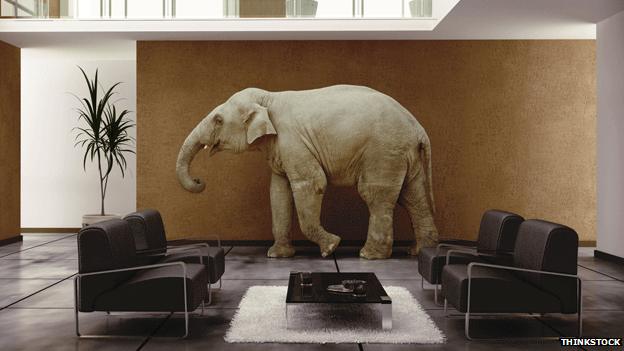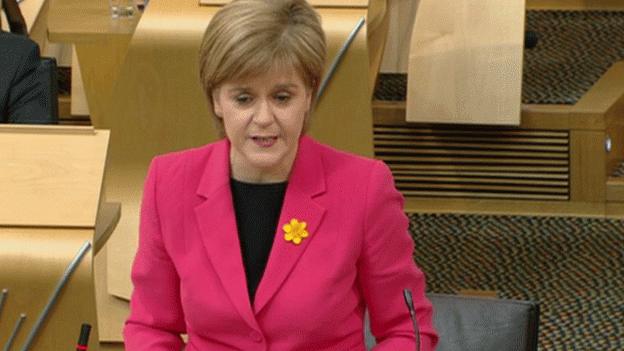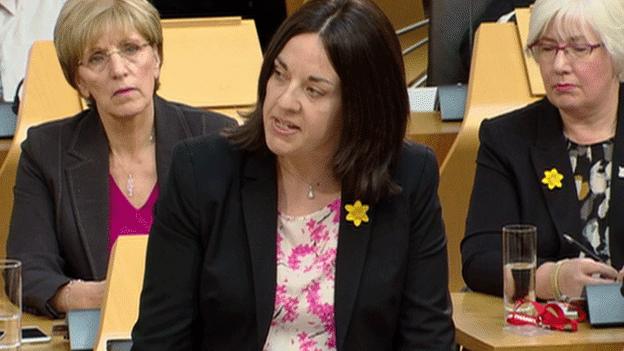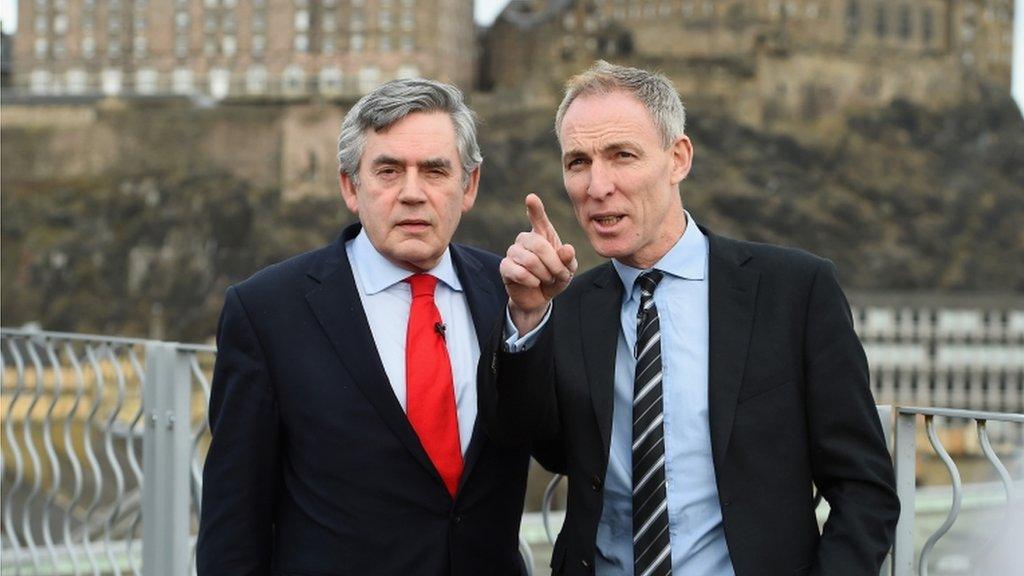FMQs and the elephant in the room
- Published

Was the Ashcroft polling the "elephant in the room" at First Minister's Questions?
"Hello. And you are?"
"Coffee, thanks. Black. No sugar."
"Have you come far today?"
"Brian Taylor"
"Can I get you something to drink?"
"From Dundee. Easy journey."
Political exchanges are, sometimes, less than enlightening. Today's discussions at Holyrood followed, to some extent, the disjointed pattern noted above.
Labour's Kezia Dugdale pursued the pattern she has made her own of asking an iterative series of questions, this time about the role of women in society. Longing, presumably, for the days when the SNP had an apparent problem retaining female support.
John Curtice: "The message we should take away is it is going to be a tough fight in that seat [Kirkcaldy] and many other Labour held seats across Scotland."
Ms Dugdale, of course, knew the answer to each question she posed - and knew that, at face value, they did not represent good news for the Scottish government.
The First Minister knew that too - and said so - although perhaps Nicola Sturgeon went a little far in suggesting that her interlocutor's "entire objective" was "to talk Scotland down".
Anyway, Ms Sturgeon has plainly got fed up of the iterative approach. She answered the questions in her own way: that is, by talking about broad policy rather than giving the precise information sought.
Dog not barking
Further, the FM returned repeatedly to one topic, say college funding, when Ms Dugdale had sought, iteratively, to move on to another.
The result? A rather curious and somehow unsatisfactory blend. Partly, of course, the FM was evidently frustrated by the dog that, disappointingly, declined to bark.
You could just see her thought processes. "Look, never mind all this, when is somebody going to mention those Ashcroft polls?, external Have you SEEN them? Ya absolute dancer!!!"

Follow the election story

Keep up-to-date with all the twists and turns of general election campaigning by going to our politics pages.
Have a look at our poll tracker on the UK-wide picture.

As Ms Dugdale stubbornly pursued her line of questioning, Nicola Sturgeon contrived - twice - to refer none too obliquely to Lord Ashcroft's polling which suggests that the SNP is set to do rather well, to say the least, in May's UK General Election.
Contrivance One. Ms Dugdale - somewhat unwisely - suggested that the FM might provide a straightforward answer without mentioning the Labour Party.
Summoning her best ironic glare, the FM said she could well understand why Labour would not want to mention their own position in Scotland.
Contrivance Two. Right at the end, she said her government was delivering on policies, producing an enthusiastic response from the people and leaving "Labour languishing in a desperate position".

Nicola Sturgeon was in the Holyrood chamber answering questions the day after the latest Lord Ashcroft was published

Deputy leader of the Scottish Labour Party, Kezia Dugdale, asked the FM about the living wage and apprenticeships
On the day, it was highly effective. Polls? Nary a mention in precise terms. But everyone in the chamber and watching at home knew what was happening.
The Ashcroft polls focus on individual constituencies. But, in generic polling, the situation is no better, it would appear, for Labour. Since the referendum, the SNP has maintained an apparent lead over their rivals.
Such a lead has been witnessed previously in contests for Holyrood. After all, the SNP has an overall majority in the Scottish Parliament. It would now seem that this phenomenon may be replicated in a Westminster contest.
What has happened? Several factors could be contributing. One, a feeling perhaps that Labour has been tactically outfought by the SNP in sustaining community links - the hard, daily graft that brings eventual success.
Two, perhaps partial punishment for Labour in working class areas for combining with the Tories in Better Together. Three, the relative popularity of the Scottish Government, despite Jim Murphy's more vigorous efforts to hold Ministers to account.
And, four, the aftermath of the referendum. It seems likely that those who formed the 45, those who voted for independence, have undergone an energising process. Rather than slump into despond, they have been enlivened by the very process of intense political engagement with its emphasis upon Scotland's interests.
Think Scot
Which has resulted in a substantial section of the population in Scotland continuing, even at this UK General Election, to ask who best speaks for Scotland, rather than focusing primarily upon the issue of who should be chosen to enter Downing Street. In short, to think Scot, rather than Brit.
From that underlying mindset, they translate support for independence into support for the SNP. One very experienced SNP canvasser told me that umpteen people now routinely tell him: "Aye, I voted for you in the referendum. Think I will again."
That is despite the SNP's repeated insistence that the referendum was about Scotland, not party. They did so, fearing that party allegiance might put potential indy supporters off. Ironically, it now seems to be working the other way. People would appear to be coming to the SNP through independence.
Will that last? It might - at least through to the UK General Election in May. Or it might dissipate to some extent when the focus upon the incumbency of Downing Street becomes sharper.
The Labour conference on Saturday could be intriguing. In both senses of that word.
- Published5 March 2015
